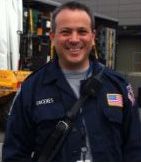By Rick Markley, Editor-in-Chief
There are countless reasons to pause our daily lives this week and reflect on the terrible loss and incredible heroism from Sept. 11, 2001. Likewise, there are countless reasons to explore what that day taught us and the actions we need to take based on what we learned.
To that end, I asked the Fire Chief/FireRescue1 editorial advisory board members to contemplate two questions.
- What lessons did we fail to learn from 9/11?
- What lessons did we learn but fail to act upon?
Some of their answers may surprise you. Please use the comment section below to add your own insights and perspectives. As important as it is that we never forget, it is more important that we never stop learning from the things we remember.
 Linda F. Willing
Linda F. Willing
In his article “Understanding How Organizational Bias Influenced First Responders at the World Trade Center” published in Psychology of Terrorism, 2007, Chief Joseph Pfeifer of the FDNY clearly describes the lack of information sharing between police and fire on 9/11.
The FDNY and NYPD had a history of in-fighting between the organizations that had led to an expectation of “stovepipe management” at incidents — entirely separate command structures where little interaction and communication occurred between the two groups.
This lack of communication was not malicious. It was simply the norm between two groups who had years of history of bad blood and poor coordination between them.
As a result, on 9/11 the police department had access to information (largely from their helicopters) that was never shared with firefighters on the scene. This information led to an urgency of evacuation from the towers for police officers that was not shared among firefighters.
Had command that day been unified instead of fragmented, “there would have been a sense of responsibility not only for one’s own organization but also for the other’s. As a result, many more firefighters and other emergency responders would be alive today,” Pfeifer wrote.
New York City was not unique in having conflict and differences among response agencies. In my work with emergency services organizations around the country, I hear it all the time.
- Police and fire don’t get along.
- Fire is at odds with the contract ambulance service.
- Fire blames dispatch for not adequately screening calls.
- Uniformed and civilian employees within a department can’t work together.
- A fight nearly broke out the last time paid and volunteer firefighters were working the same incident.
These conflicts are bad enough in themselves. But when they result (as they inevitably do) in groups hoarding information or not even considering the needs of others when managing communications, then real harm may result. As Chief Pfeifer said, lives may be lost.
There was some improvement in this area shortly after 9/11. People were so anxious to do better, to share their loss and to never, never have a day like that happen again.
But in more recent years, I have seen backsliding. Organizations may dig into their individual identities at the expense of critical information sharing with others.
For me, this is the crucial lesson of 9/11 — learned, but perhaps not completely ingrained in the cultures of many emergency response agencies.
 Phil Stittleburg
Phil Stittleburg
I’m not sure that I have a good feel for unlearned lessons or those that we have failed to act on. Instead, what I see are lessons that were learned and are still being acted upon, with varying degrees of success.
Linda Willing’s comments are on point. They can be expanded to include the significant emphasis we have seen on planning for large-scale events at the regional and national level. Hurricane Katrina and the difficulties experienced in that response brought more attention to this effort.
I believe that we have seen progress in this area. In the Midwest, for instance, we have seen a major increase in the use of MABAS (Mutual Aid Box Alarm System). While there is certainly a long way to go, I see marked progress here.
At the risk of sounding like a broken record, interoperability is still a challenge. The problem of inadequate fireground communications certainly seems to have played a major role on 9/11.
Considerable attention and resources were brought to bear soon after. We lived through endless debates about spectrum use and spectrum sales and now, for better or worse, have Firstnet.
Perhaps we underestimated the technical challenges or the political hurdles. Perhaps this is just a whole lot more complicated than it seems like it should be. Whatever the explanation, the solution still seems to elude us.
The extended 9/11 response resulted in some long-term health effects that are still being examined and only partially understood. However, in the last several years, we have seen much more attention paid to firefighter cancer.
I doubt that it can be determined with any certainty to what degree 9/11 has impacted this, but I intuitively think that it had some effect. Again, there is much work remaining to be done, but it would seem that this lesson has likewise been taken to heart.
 Pedro Caceres
Pedro Caceres
Some time after the 9/11 attacks we began to try to understand what it meant to have lost 343 firefighters. Beyond the personal loss to its members, what would be the operational impact on the FDNY to have literally lost thousands of years of experience at all levels of the organization?
I remember reading articles about what it meant to lose that much experience from firefighters, company officers, chief officers and command staff and the challenges those loses would bring to the organization. They discussed the new dangers, the learning pains, the mistakes and lessons that would have to be relearned by many as they assume new roles and responsibilities.
The 9/11 attacks, among other things, reminded us of the need to prepare younger generations to take over our jobs.
The fact is that most of us are not likely to experience an incident such as this one. It still has highlighted the need to prepare for the possibility that eventually or unexpectedly we could have a loss of members, knowledge and experience that they had.
Fifteen years after the attacks, succession planning is one of many lessons that the fire service seems to continue to struggle to grasp. In my experience, we continue to be too busy handling the now needs and easily forgo the efforts to teach, train, educate and mentor those who will replace us. Planning becomes an activity that is easily pushed to tomorrow, and we neglect to reach down to those who will be moving up.
Additionally we seem to have developed a culture, at all levels but especially at the company level, where ambitious firefighters are looked down upon and their professional aspirations stifled. We continuously remind firefighters that they do not have enough time on the job, that going to the “other side” is not a desirable outcome, that promotions are a way of turning your back on your fellow firefighters.
This typically results as last-minute attempts to prepare or to learn as much as you can once a promotion is made. Learning on the job can result in costly lessons.
It is time revisit this lesson learned and begin to foster an environment where we are not threatened by younger firefighters eager to grow and learn. We need an environment where we are comfortable leading the aspiring firefighters to take over our jobs.
What do you think? What have we failed to learn from 9/11? What have we learned, but not yet applied? Leave your answer in the comments.













